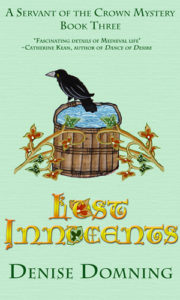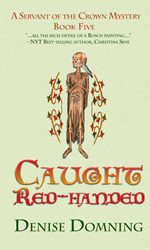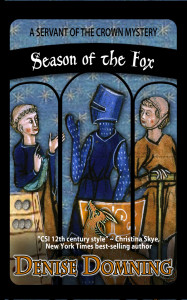Excerpt, Season of the Fox
Chapter One
“I will not do it,” Brother Edmund protested, nay, pronounced, his well-made face twisting in disgust. Then he blinked rapidly, a sign that he realized just how rude his response had been. “What I mean, sir, is that I cannot do it. That is a woman,” he amended, pointing the feathery end of his ink-stained quill at the corpse in the corner of this November-chilled chamber.
Sir Faucon de Ramis, the newly-elected Coronarius for this shire and now proud master of Blacklea Village, sent a narrow-eyed look at his clerk. He and Edmund had known each other for all of two sennights, the same amount of time that Faucon had been responsible for keeping the shire’s pleas. Although that had been long enough for him to discover much good in Edmund, his clerk daily tested the limits of his patience.
Two weeks had also been enough time for Faucon to learn that Edmund could use an excuse as well as any other man, be he knight, cleric or commoner. While it was true that the Benedictine brothers were avowed not to touch women, both he and Edmund knew that wasn’t why the monk was resisting his master’s command. Edmund no more wanted to expose himself to the possibility of fleas than did Faucon.
Edmund met Faucon’s gaze in a wide-eyed pretense of innocence. Then he cleared his throat. Faucon now knew that sign, too. Edmund meant to resist his command with all his might.
A low rumble of amusement rose from the seven men and three women crowded into this impoverished chamber. Although Faucon and Edmund were speaking in their native French while the watching commoners spoke only English, these folk were hardly strangers to the covert war presently being waged between master and servant. This was the sort of battle they prosecuted daily, resisting their own rightful masters. So it had always been between those who were born to serve and those whose God-given right it was to command service.
“What I mean, sir,” Edmund amended, “is that I cannot assist you, not if I’m also to record the names of all these witnesses prior to you calling the inquest.”
This time, the clerk used the end of his quill to indicate the watching folk. As he did, the wide sleeve of his black habit swept across the surface of the parchment on his lap desk. Edmund, who intended precision and perfection in all things at all times, squeaked in dismay.
“Nay! I’ve smeared the ink! Now I shall have to scrape all off and begin again.”
All else forgotten, the monk retrieved his knife from the lidded basket in which he transported his scribing tools, and began to hone its edge on his stone. Faucon grimaced in defeat. How much easier it was to force a man to his will when armed with a sword rather than just his tongue.
Pivoting, he aimed the full force of his frustration at the corpse as if he could blame her for setting him on yet another fool’s errand. His new position as Coronarius had been created out of whole cloth at the Michaelmas court a little more than a month ago. The unstated purpose of the position was to insure more of this shire’s pennies made their way into the Lionheart’s strongboxes, and less into the purse of Sir Alain, this shire’s sheriff.
So far, Faucon had failed miserably at his purpose. Of the six deaths, two burglaries and one rape, which had turned out to be a lover’s spat, that Edmund had recorded onto their ever-lengthening roll of parchment, not one event had added so much as a farthing of profit to the king’s treasure chests. If Faucon wished to reward his uncle’s faith in him, then he needed a death where the murderer had at least some wealth to his name that could be confiscated in the king’s name.
That most certainly didn’t describe Garret of Stanrudde. Both Garret and his dead mother were but day laborers, working as weavers of linen cloth, or so said the half-finished pieces of fabric in the tall looms standing on the street wall of the chamber. The only things of value these two owned–if they owned them–were the chamber pot in the corner and the clothing hanging from the pegs near the door, which was naught but a leather curtain. No doubt even the fleas infesting both the mattress and the tattered blanket atop the corpse belonged to their landlord, the Abbey of St. Michael.
And therein lay Faucon’s conundrum. With him so new to his position and this shire, it was a miracle that Abbot Athelard had known to send for him rather than the sheriff. Faucon supposed fleas and yet one more failure were a small price to pay to secure a crumb of favor with an influential abbot. Moreover, making the abbot into an ally would surely tweak Sir Alain. It was the thought of the unfinished business between him and the sheriff that ultimately propelled Faucon across the chamber.
He dropped to one knee at the edge of the mattress, which was barely more than a hen’s nest contained in a worn hempen sack. Shifting his sword until it rested easily on the wooden floor, he threw back the edges of his better, vair-lined mantle, then brushed the front of his borrowed green tunic as if it were already infested with the nasty little bloodsuckers. If he did take on fleas, he’d owe an apology to Blacklea’s former steward when he returned the garment, something that wouldn’t happen until his own garments and personal possessions finally arrived at Blacklea. It was anyone’s guess when that might happen. According to the last message from his family, his belongings were now in the custody of a wool merchant, who would pass by Blacklea as he made his way from fair to fair across the shire.
When Faucon could procrastinate no longer, he leaned gingerly forward and studied the old woman. Frail and thin, Elsa of Stanrudde lay trapped in the ever-disconcerting stillness given to the dead. Her earthly remains had already grown stiff. It had taken a good while for Faucon to reach Stanrudde from his new home. Given that the sun was well past its zenith–the bells for the hour of None had recently sounded–she must have passed sometime last night, no doubt earlier than later. Fading bruises marked her right eye socket and her left cheek.
“When you are finished plying your knife, Brother Edmund,” Faucon said without turning his head and yet speaking in his mother tongue, “you must add that the dead woman shows signs of having been beaten by someone using his fists but that the bruises are days old and well on the way to healing.”
He pulled back the thin blanket. As with most folk who owned but one set of clothing, the old woman had retired for the night in nothing but her wrinkled skin. Even older bruises, also the size and shape of a man’s fist and an ugly shade of yellow, marked her breastbone.
Elsa’s granddaughter, Ida by name, came to kneel beside Faucon. It was she who had raised the hue and cry after arriving early this morn for a visit and finding her grandmother dead; it had also been she who made the charge of murder and brought it to her kinswoman’s landlord. A fair young thing, Ida wore a pair of tightly-woven gowns, the upper one bright blue, the inner one dark red. Their quality suggested she lived a better life than her grandmother and uncle.
Tears sparkled in her pale eyes as she looked at the marks that discolored her grandmother’s chest. “If only my husband would have allowed me to take her into our home, but we just couldn’t afford to feed another mouth,” she whispered in English, her words fading into silence.
Faucon made no reply, only traced his fingers across the line of the dead woman’s collarbone. Beaten but not broken. Then he rolled Elsa onto her left side. What little long gray hair remained to her streamed across the bluish-red discoloration that stained her back from shoulders to rump, save where her body had touched the pallet. That teased a grief-stricken moan from her granddaughter.
As Faucon lowered the corpse back onto the mattress, Ida leapt to her feet and pointed at her uncle. “Didn’t I say that you killed her! You finally beat her to death just as I knew you would! How could you do that to your own mother?” she demanded in righteous accusation.
Panic twisted Garret of Stanrudde’s features. Ida’s uncle stood as far as he could from the mattress and his mother, beside the looms that paid their meager wages. Although it was mid-afternoon, Garret yet wore only his shirt and braies, the length of cloth all men wrapped around their hips to cover their nether parts. The fabric of his undergarments was ragged with age and use. As small and frail as his mother, Garret’s pronounced cheekbones suggested he ate more sparingly than most monks.
“I didn’t kill her!” he protested. “Didn’t we both find her this morning when you came and woke me? She was just as she is now–blue and lifeless. I told you, she was quiet all day yesterday, barely able to ply her shuttle and finishing only half as much as she usual wove. I let her be when she said she felt ill and retired early.”
Still pleading, Garret turned to look at his neighbors, who had responded to his niece’s calls of murder and who by law were trapped here until Faucon released them. Garret reached out to grab the man closest to him by the sleeve of his brown tunic.
“Watt, tell Sir Crowner,” he pleaded, using the commoners’ corruption of Faucon’s Latin title, one Faucon had begun to encourage simply because he liked the sound of it. “Tell the knight that you heard no cry or complaint from her last night. Not last night!”
Watt was squat and short. Although his face was half-concealed by a wild red beard, there was no missing the dislike he felt for his neighbor. The other witnesses all shifted uneasily. Faucon recognized the meaning in their collective movement, having seen it more than once over the past weeks. Those living closest to Garret disliked him and were wondering if they might rid themselves of an irksome neighbor through simple silence or a lie of omission.
Garret saw the same thing. “Nay!” the weaver shouted. “You won’t do this to me. You have to tell Sir Crowner you heard nothing, because that is the truth. You heard nothing!”
He took a step toward Faucon, his brows lifted and his arms spread wide in a gesture of innocence. “Sir, they hold their tongues because they don’t like me. They would have heard her cries if I’d touched her last night. They always did. Didn’t Father Herebert always come a-knocking each and every day after we fought, ready to remind me that I must honor my mother even though she had a vicious tongue and rained nothing but complaints down upon my head?”
“And no doubt your priest also reminded you that Church law doesn’t allow you to beat your family with your fists, only with a stick no wider than your thumb,” Brother Edmund chided under his breath and in his native tongue, his head yet bent over his parchment as he scraped off smeared ink.
Elsa’s son spoke over the muttered comment. “It’s not my fault that I beat her. She drove me to it, she did. But I never touched her last night. Not last night.” His last words were almost a sob.
“Did you hear them arguing last night?” Faucon asked directly of his witnesses, shifting into their guttural English. He’d learned the tongue as a babe at his nurse’s breast.
Once again the assembled folk shifted uneasily, this time glancing between themselves. A woman, one who looked as worn and old as Elsa although far more neatly kept in her faded orange and yellow attire, spoke up.
“Nay, it is as Garret says. All was quiet in here for a change, thank the Lord. I live right there.” She pointed to the wall behind Garret’s and Elsa’s shared mattress. “The panel between our chambers is no thicker than this.” Now she touched the neatly mended white cloth that covered her grizzled hair and pronounced her at least once married, although her words suggested her life was presently a solitary one. “I heard every word they ever said to each other. There wasn’t so much as a squabble last night.”
The old woman was right about the thin walls of this structure. Didn’t Faucon’s bones rattle in time to the rhythmic metallic ring of hammer on metal from the next door copper smithy? The pigeons loitering atop the mossy thatch roof above him could have been perched on his shoulders, so audible were their gentle coos. And, although these chambers were a full storey over the lane below, he could hear the squeak of the wheeled cart used by a costermonger hawking ‘best for cider’ apples, which, if Faucon’s guess were correct, meant halfway to rotten. From a distance came the indistinct echoes of a good number of people screaming and shouting.
“Magda,” hissed the red-bearded man.
The old woman glanced ruefully at her neighbors. “I cannot lie, not about this, not when I must forever after carry it upon my soul,” she whispered, her tone begging their forgiveness for her forward speech. It was not a woman’s place to give such testimony.
The tallest of the men, who wore an oft-repaired green tunic sighed. “Nor should you,” he agreed, although his expression suggested he regretted her honesty. He put his arm around the woman next to him, who was nearly as tall as he, then looked at Faucon. “Magda is right. Neither my wife nor I heard anything from them yesterday. We noted it because it was unusual for them not to at least bicker.”
Faucon expected no other answer, but Elsa’s granddaughter moaned in disappointment. “But he beat her all the time. You can see the bruises. Look at her back! It’s nothing but a great bruise,” she insisted.
Once again brushing hopefully at his tunic–as if something so simple as a flick of his wrist could actually dislodge any of the fleas that might have found him–Faucon came to his feet. He shook his head to deny her charge. “That is not bruising and well you know it, goodwife,” he told her gently.
There wasn’t a soul in this world who hadn’t helped wash or wrap a dead kinsman in preparation for burial. If even the smallest children knew such coloring was a natural process that affected all the dead, no matter the cause of their demise, then Ida did as well. He suspected her own guilt was keeping her from admitting it.
“Your grandmother clearly passed in her sleep. At her age, her death can hardly be considered sudden, nor was it homicide or a death felonious,” he added, using the term that legally described the mortal sin of suicide. “Against that, there is no point in calling for an inquest, not when the only possible verdict is that our Lord’s angels came to bear your grandmother’s soul away with them.”
“God bless you, sir!” Garret cried, his voice rising almost to falsetto in his relief as he staggered back to collide with his loom. It clattered as it shifted.
At the same instant, the apple seller in the lane broke off mid-cry to shriek, “Stop, you! Vandal! You’ve broken my cart and spilled my apples!”
“Grab him, you! Don’t let him pass! Murderer!” another man screamed.
A third offered a gasping, “Neighbors, stop him, stop Peter, son of Roger! He’s killed Bernart the Linsman!”




















